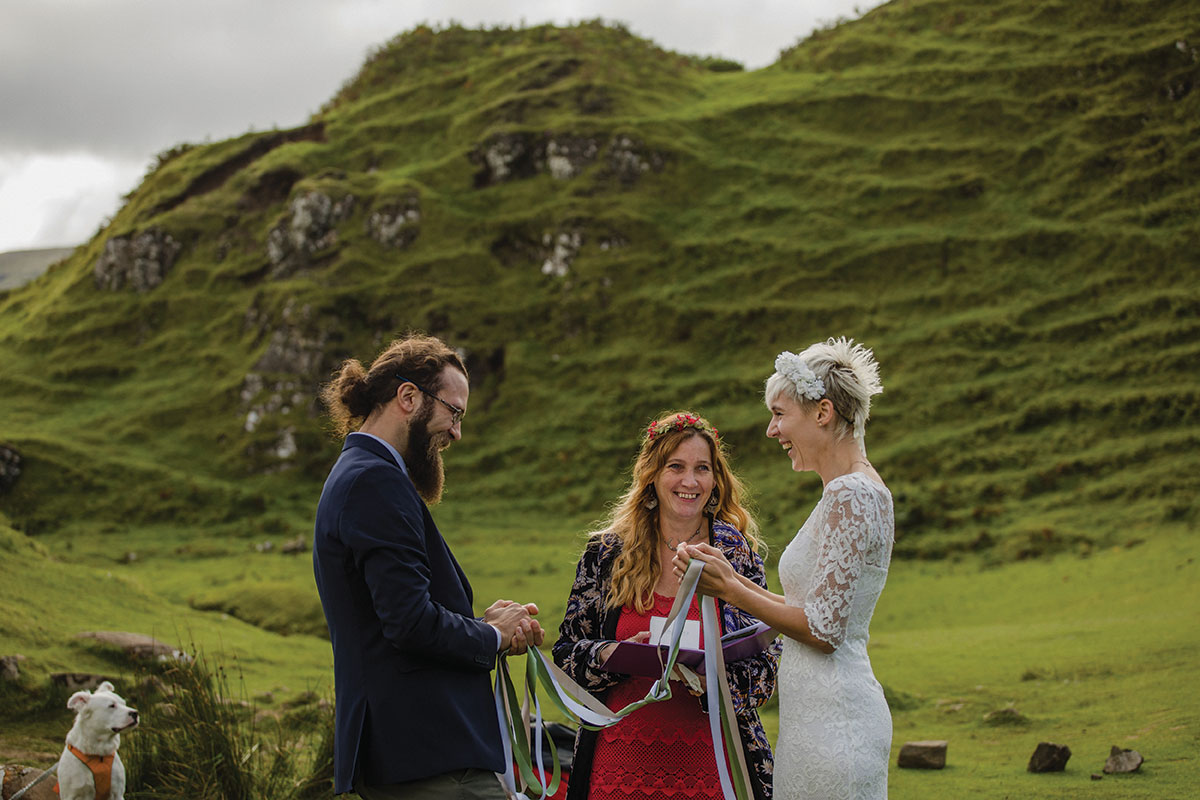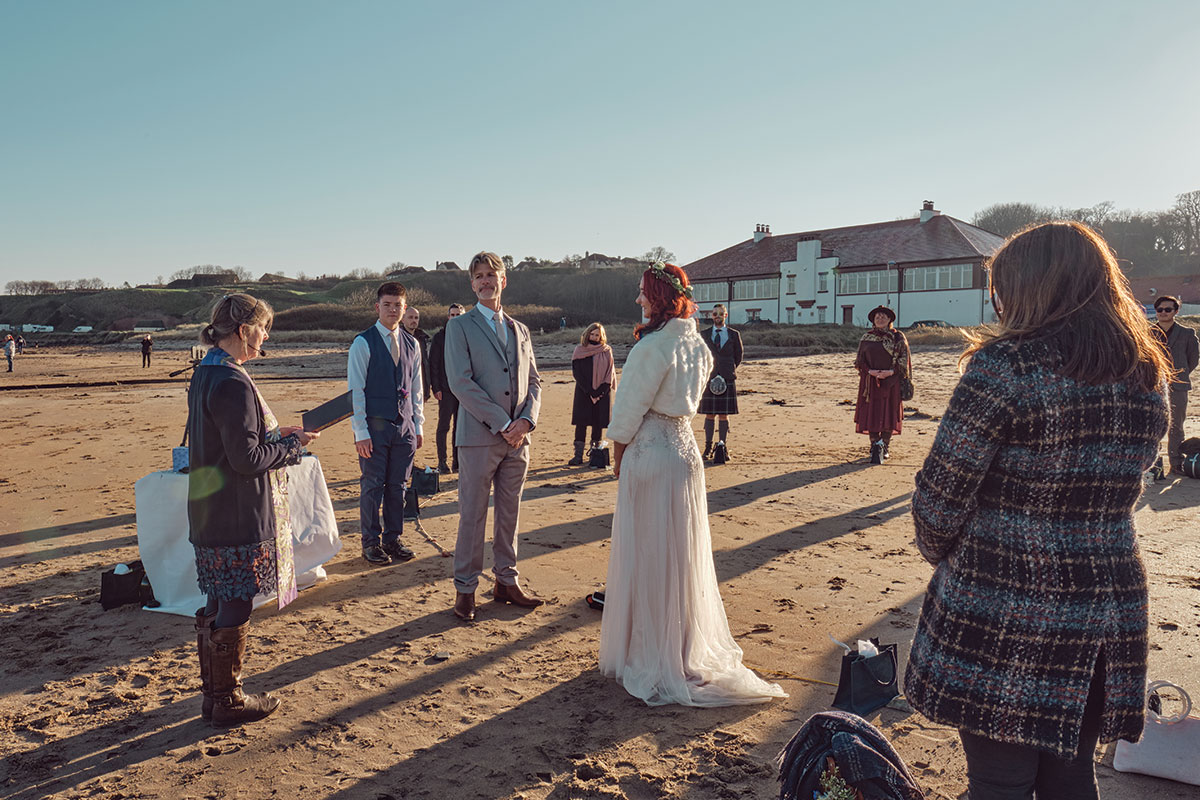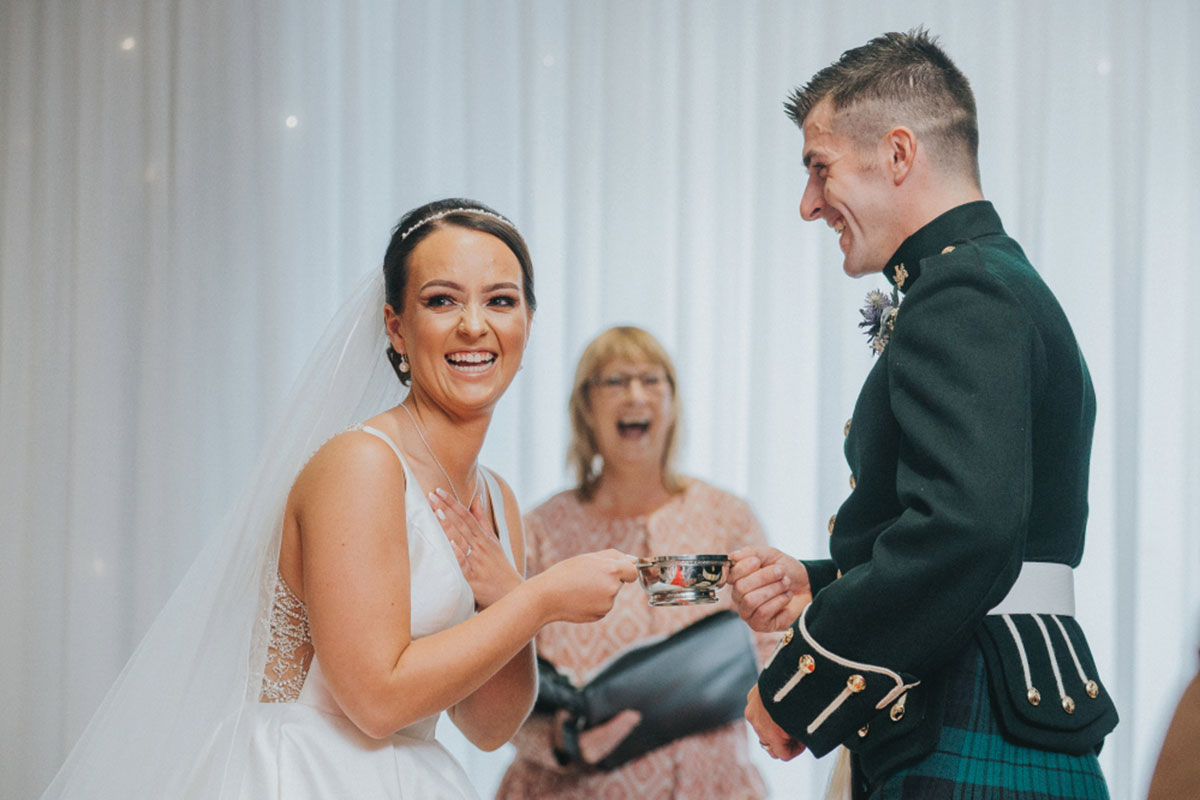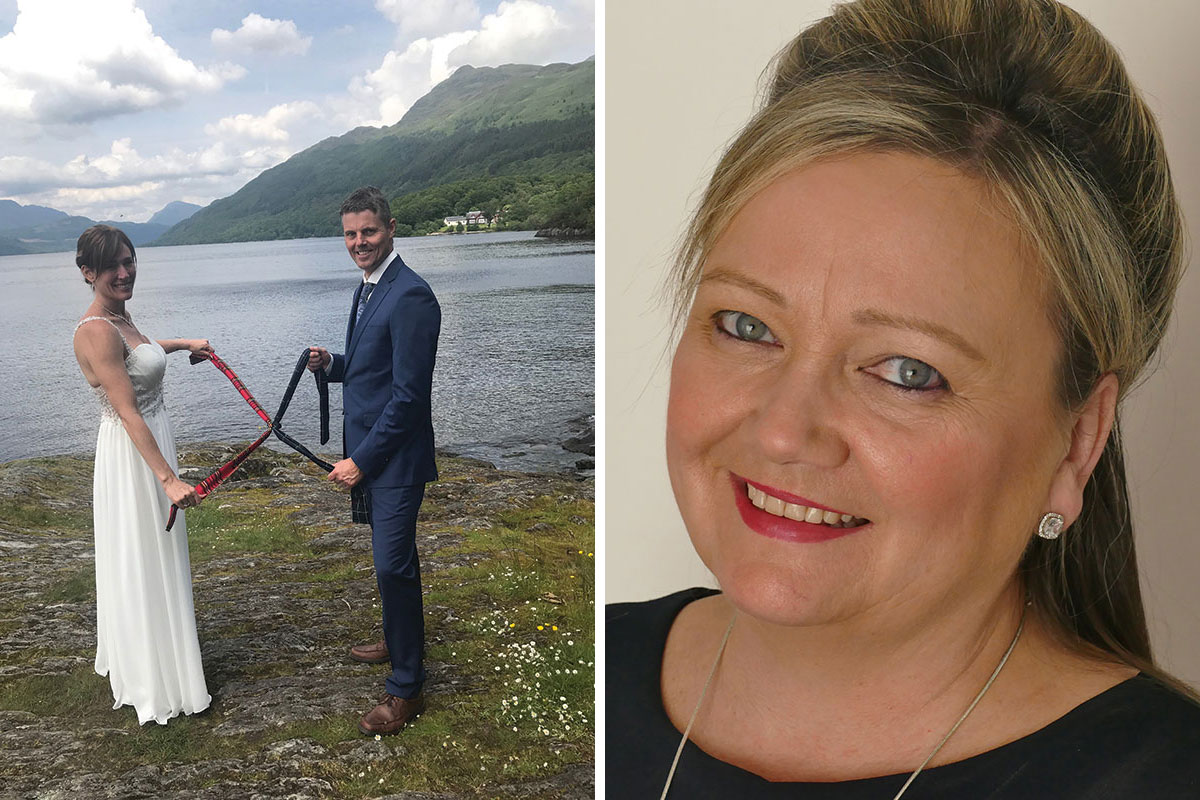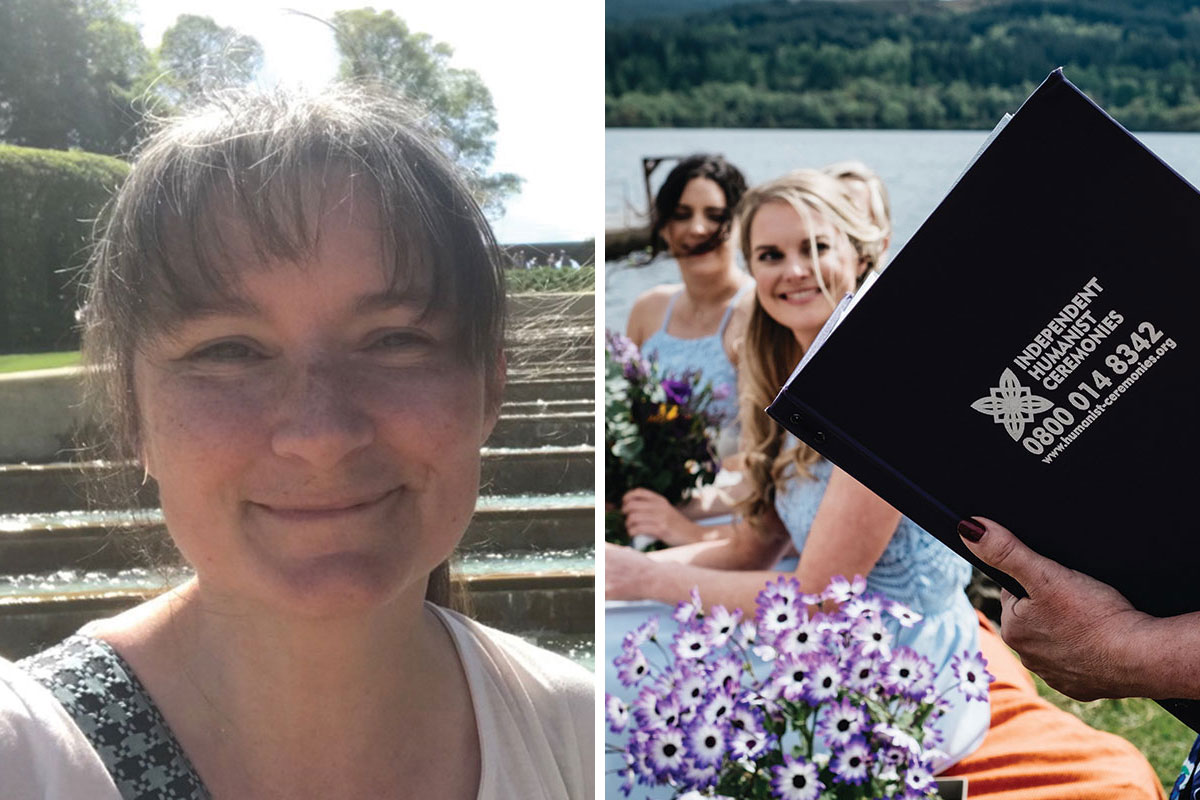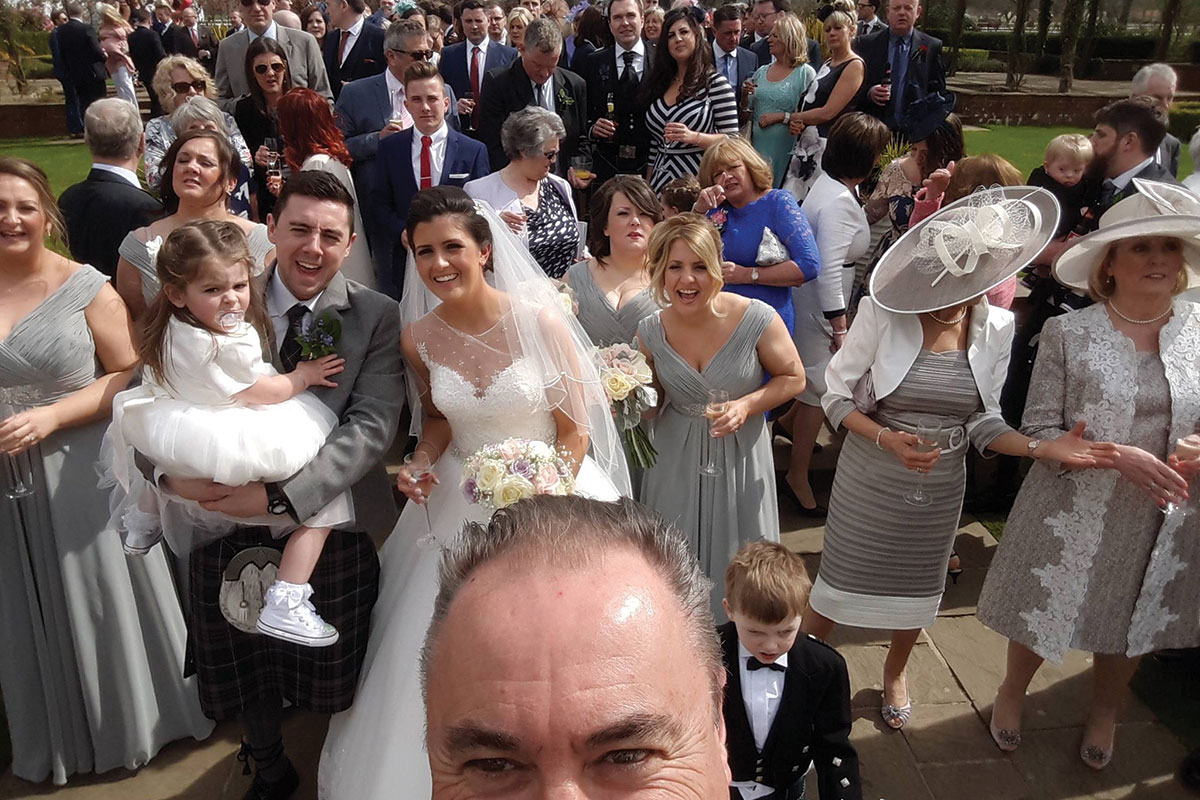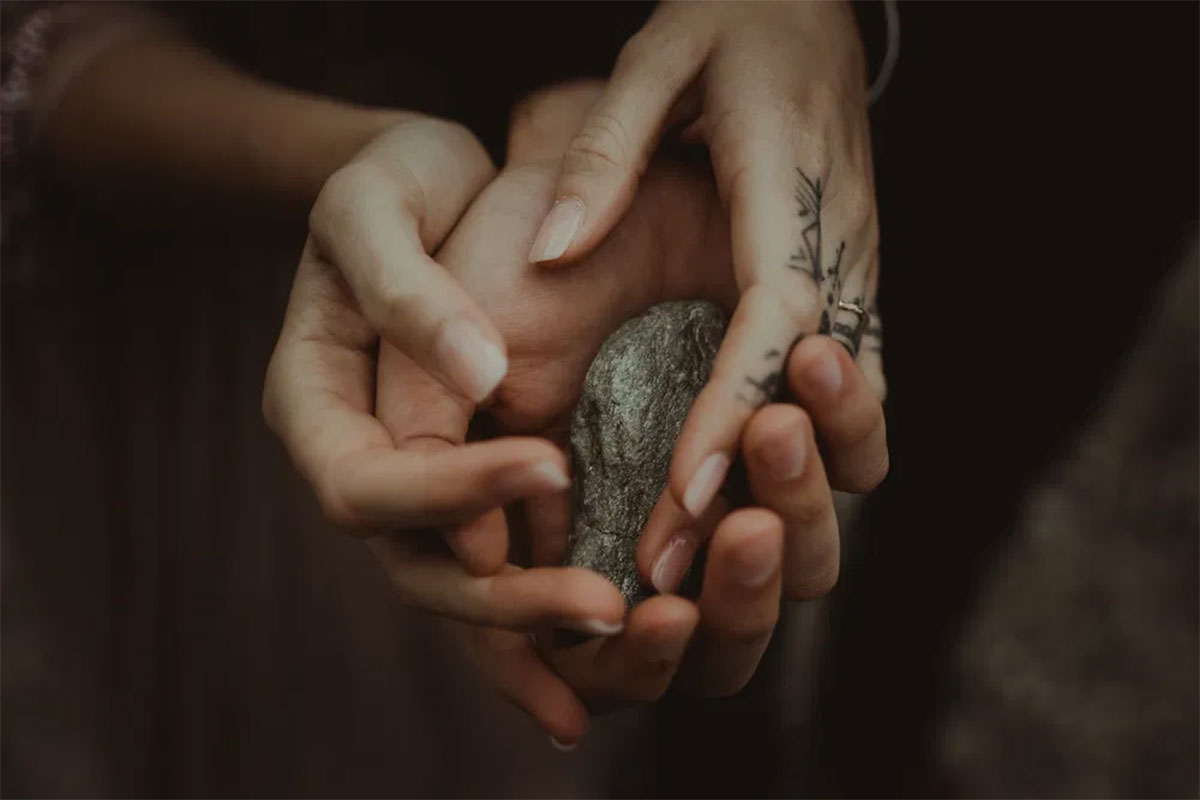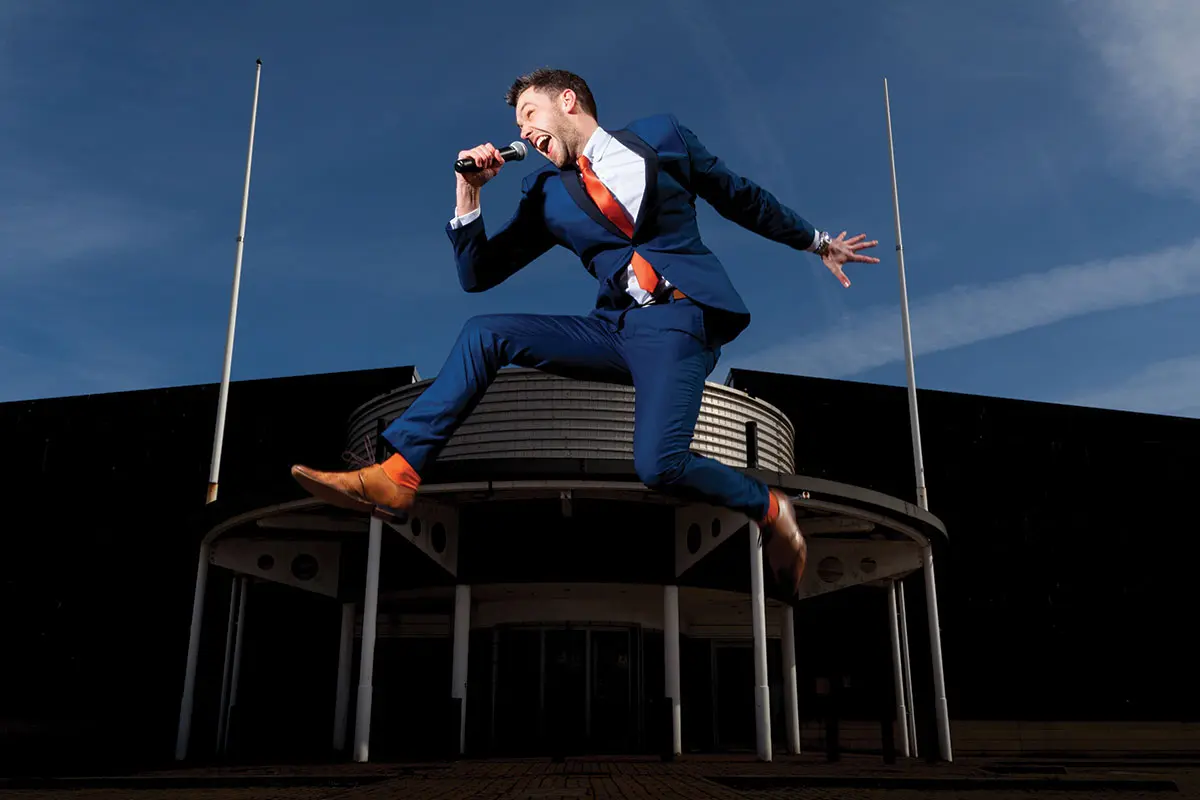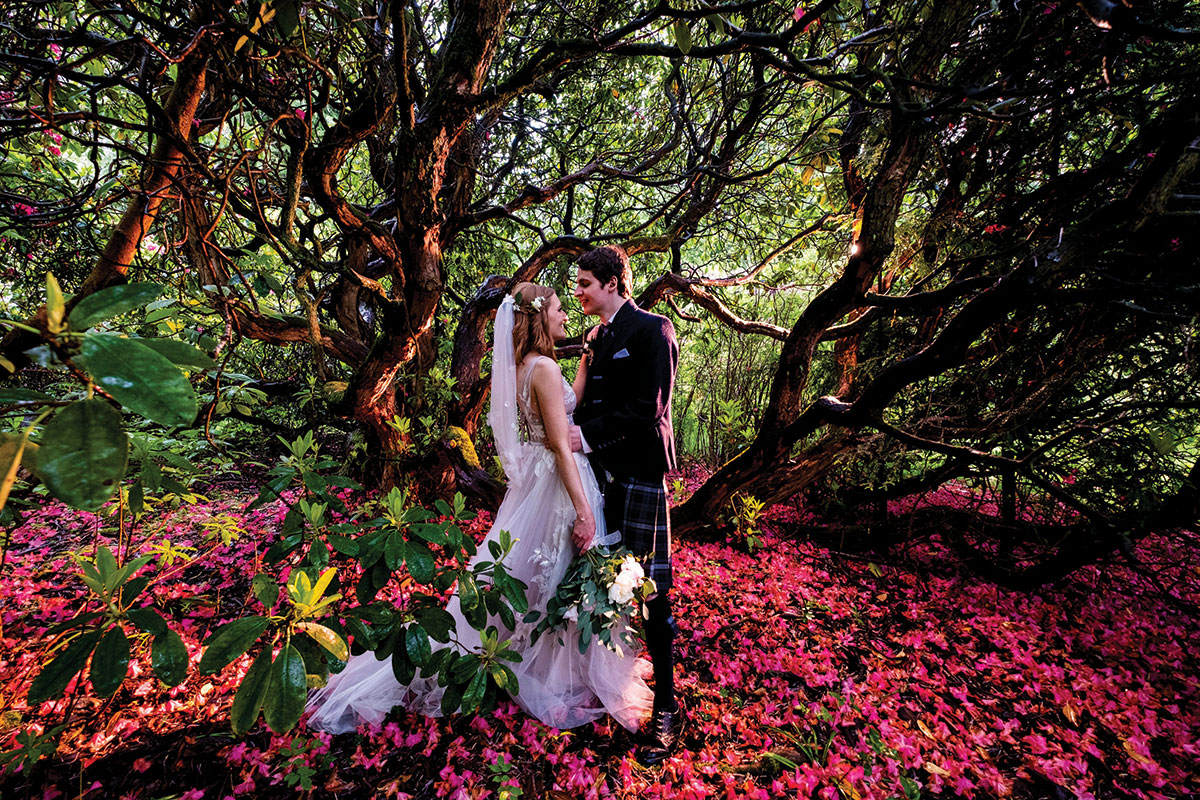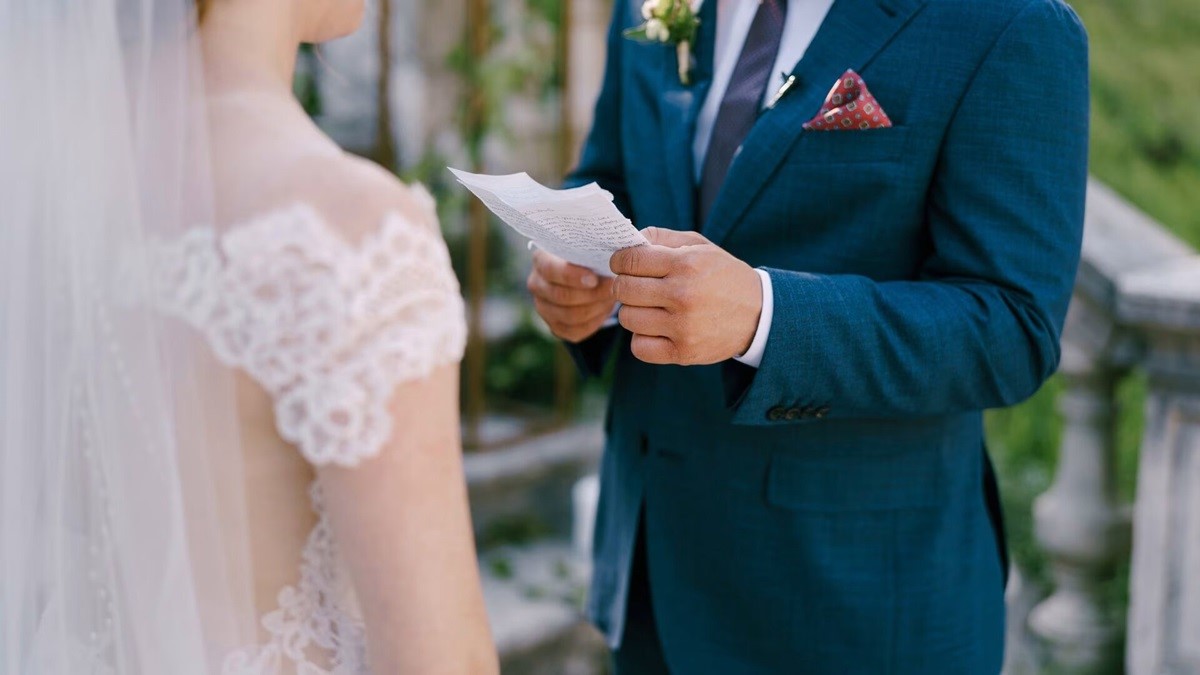All you need is love – plus someone to legally marry you. With celebrant-led weddings soaring in Scotland, how do you find the best person to oversee the ceremony?
Davina McCluskie, Scottish Highland Weddings
Hi Davina. Tell us a bit about yourself I’ve been an interfaith minister and celebrant for seven years now, covering most of the Highlands and other parts of Scotland, but prior to that I was a fitness instructor.
Any advice for clients who are struggling to write their vows? If you’re finding it difficult, I can send examples along with a few ideas based on your own love story. I would, however, encourage you to write your own vows: it’s always so much more meaningful when it comes from the heart.
How much work should a couple expect to put into their ceremony? I send a set of ‘homework’ questions to the couple and then write the body of the script based on their answers. Some couples don’t give lots of information; others have a very specific idea of what they want to say. Either way, I do not expect the couple to put in lots of work (it’s why they’ve hired me, after all), but the more background I have, the more personal I can make the ceremony.
Jane Patmore, OneSpirit Interfaith Foundation
What’s your background, Jane? I’ve had a variety of careers – research scientist, manager, training consultant. Each role has added to my skills – I’m organised, empathetic, creative and a good listener, with solid writing skills, and I can handle presentations and public speaking. I’ve been a celebrant for 11 years now. Being an interfaith celebrant gives me the flexibility to include whatever is meaningful and important to the couple – whether non-religious, religious or a blend of both.
What should couples expect from their celebrant ahead of the wedding? Clear information about costs, availability, terms and conditions, and what is possible in the ceremony; prompt replies to questions and emails; receipts for payment; guidance on the legal process and the paperwork that must be completed; and a schedule of meetings to allow the celebrant to find out about the couple, taking their ideas and words and turning them into a ceremony, with a draft script they can amend.
How do you help couples who are lacking inspiration for their ceremony script/content? I send every couple I work with a copy of my book, Celebrate Your Love. It contains examples of every part of the ceremony, along with suggestions for creating your own vows. It’s full of practical advice and ideas about wedding customs to provide inspiration.
Mo Ackroyd, Fuze Ceremonies
Hello Mo! What do you like most about being a celebrant? It’s the best job ever – I wish I’d changed career sooner! (My background is business and event/project management.) It is an absolute honour to work with couples to create a wedding ceremony that’s all about them and their journey, from telling their guests how they met to then formally pronouncing them newlyweds.
How much work should a couple expect to put into their ceremony? Some effort is required – it is like piecing together a jigsaw puzzle. I would suggest a few hours of meetings with me (preferably face to face), so I can begin to write the ceremony script. They also need to decide on the wording they’d like for the legal vows – at Fuze Ceremonies, we give couples four options to choose from. I’ll then supply a draft and suggest that you spend a few hours reviewing it to ensure you’re completely happy with it.
What are your favourite ‘rituals’ to include in a ceremony? I am a fan of drinking a nip from the quaich as a symbolic first act of union. Those looking for something a bit different might want to consider the Oathing Stone ritual – couples say their vows while holding an oathing stone in their hands – thus literally setting your vows in stone. For particularly Scottish weddings, an exchange/pinning of family tartan brooches or the gifting of a Luckenbooth brooch [a traditional Scottish love token] are nice inclusions.
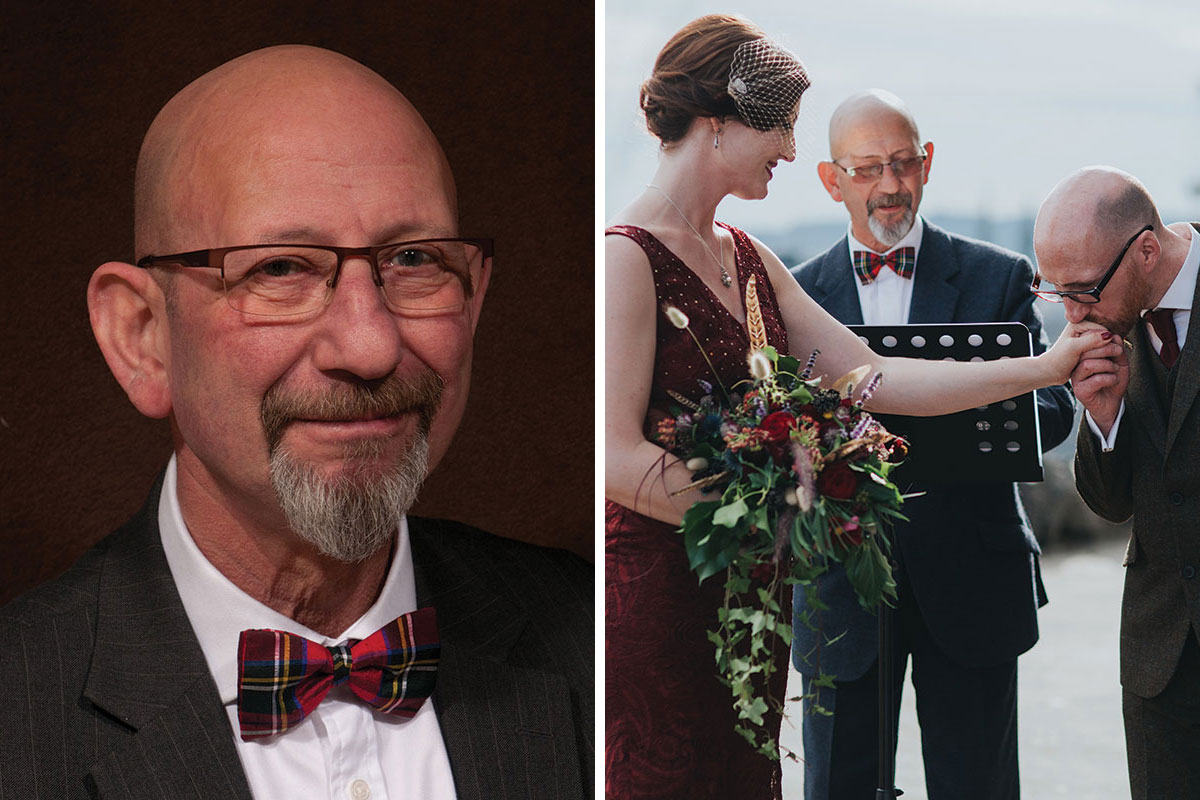
Left: Love really is Lenny’s surname! (Photo: Steve Willis) Right: One of Lenny’s favourite points of the ceremony is pronouncing the couple married. “With a surname like mine, I definitely find it emotional!” he says. (Photo: Loraine Ross Weddings)
Lenny Love, Celebrate People
Hi Lenny, tell us how long have you been a celebrant? I’ve been a humanist since I was ten years old, but I only became a celebrant just over four years ago. Prior to that, I worked in the music industry and in radio. Since changing career, I’ve realised that being a celebrant is genuinely the most fulfilling and meaningful thing I have ever done in my entire life.
What do you do to ensure the couple’s personalities come across in their ceremony? I have a secret foolproof method! No matter how ‘involved’ the ceremony may be, I make the work easy for couples. I remind them that they get to decide what their families and friends see and hear during the ceremony. All of my couples end up with a truly personal ceremony that they, and their families and friends, will always remember and treasure.
Tell us something about being a wedding celebrant that you wish more people knew I’m constantly amazed that so many couples start booking venues, caterers, florists and all the rest, and are then disappointed to discover that the celebrant they want is already booked on their big day. The shrewd move would be to do all your research first, and then give all your potential suppliers a selection of dates so you can find out who is available when.
Barbara Campbell, Marriage Scotland
Tell us a bit about yourself, Barbara I am an interfaith celebrant, which means I offer ceremonies to people of all faiths and none. You can have a completely non-religious ceremony or one that reflects your beliefs and values. I became a celebrant to use my skills in writing and presentation to help couples and families have meaningful ceremonies that would reflect what is important to them – and I’ve been doing so across the west of Scotland and beyond for around seven years now.
How do you approach writing a ceremony? I enjoy meeting my couples and getting to know them personally. They should expect to answer questions on who will be involved, any expectations and/or key requirements, and some questions that will help personalise the ceremony. It can be fun and light-hearted, and it doesn’t have to feel like a chore. I’ll be there all the way to support you with sample vows, help you write (if you’re finding it a struggle) and keep your vows true to you. Once couples see their draft ceremony, they will have the opportunity to amend it to make it exactly as they wish.
What’s the most memorable wedding you’ve been the celebrant for? It was a mixed-faith wedding, a Catholic divorcee whose partner was more aligned to Buddhism. It was a respectful and beautiful blend of both faiths, while keeping the ceremony light-hearted. It also included the Scottish rituals of handfasting and the quaich. It was so personal.
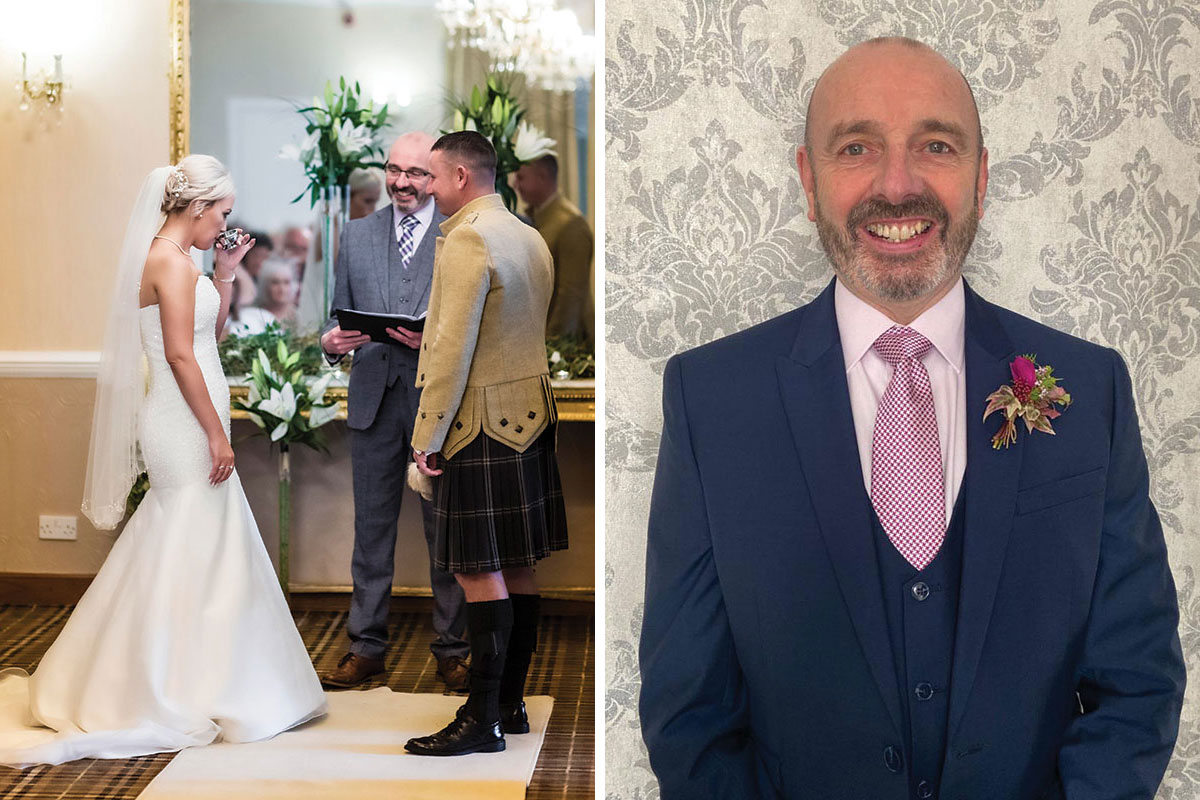
Left: Christopher in action (Photo: Danny Q Wedding Photography) Right: The man himself! “You should expect your celebrant to be a good listener, organised, approachable and have an eye for detail,” he says
Christopher Griffin, Fuze Ceremonies
Hi Christopher. What led you to become a celebrant? After attending several humanist weddings, I developed a keen interest in becoming a celebrant and wanted to make use of the skills and experience I’d gained in my personal life and over my successful 30-year career as an executive in business development, management and operations.
What should couples expect from their celebrant on the big day itself? The celebrant will, of course, conduct the ceremony, but they should also be expected to co-ordinate events on the day – things like checking you’ve got the marriage schedule; that the room is set up and safe; the props are there for any symbolic gestures; and that any pieces of music, readers or contributors are available and prepared. They should also run through things with the wedding party, and update the ceremony with any last-minute changes.
We’re lacking inspiration for our ceremony – any advice? If you’re struggling to write your own personal vows, I’ve got plenty of examples to share and discuss with you. It will help to provide ideas for your own vows. In terms of the bigger ceremony, my role is to give the couple a range of options; that’s why we don’t have ‘standard’ ceremonies; each one is created to be unique, and each couple can put into the ceremony as much or as little as they wish.
Fiona Flanagan, Independent Humanist Ceremonies
What’s your background, Fiona? I worked in tourism before having kids, then completed a first-class honours degree in literature and creative writing while raising my family. When I married in 2014, one of my current colleagues conducted the ceremony – which led to me joining the team at Independent Humanist Ceremonies.
What advice can you offer anyone who’s struggling to write their vows? Sitting with a blank sheet of paper can feel daunting, but often it’s the most simple and heartfelt words that produce emotional tears and joy on the day. You probably won’t manage to write your vows at the first attempt, so try jotting down wee notes and thoughts over the course of a few weeks. Your celebrant can also help to craft these bits and pieces into beautiful vows.
Tell us something about being a wedding celebrant that you wish more people knew A lot of people think being a celebrant simply involves turning up for an hour on the wedding day, so they feel our services are over-priced. In fact, when you count up the time spent meeting the couple, writing and editing the script, giving guidance over legal paperwork etc, you realise this is a vocation you do for love, not money!
Why should a couple choose you as their celebrant? There is no greater honour than being asked to play a part in the meaningful milestones of people’s lives, and I take that responsibility very seriously. I’m a good listener, and couples often tell me they’re surprised at how well I’ve summed up their relationship after I’ve spent just an hour or two with them.
Martin Turner, Independent Humanist Ceremonies
Hi Martin. How did you become a celebrant? I’ve always enjoyed meeting people and I’m used to public speaking. When Joan, a friend of my wife who’s now one of my colleagues, started her training, I approached Independent Humanist Ceremonies. Work-wise, it’s the best decision I’ve ever made.
What should people look for in a celebrant? Someone you feel comfortable with, and someone you’re confident will deliver the service the way you want. Experience helps, but everyone has to start somewhere. Ask lots of questions: you pay for a celebrant, so make sure they earn it! Find out if the organisation has a back-up plan if your celebrant is unavailable on the day; there are more than 30 of us at Independent Humanist Ceremonies, so we’ll always have your back.
How can you help a couple ensure their personalities come across in the ceremony? As long as the couple make their legal vows, I say the Marriage Officer’s Declaration and the marriage schedule is signed, everything else is up for creative discussion. I’ve had couples performing dance routines and singing (I was very impressed!) and guests writing poems and reading them out as part of the service. The ceremony can be anything you want it to be. Nothing is ruled out.
How much work should a couple expect to put into their ceremony? As much or as little as they want. I’ve had couples happy with their first draft, and others who were only satisfied five versions later, where I knew they’d spent hours and hours on it. Remember that, having conducted hundreds of weddings, I have a wealth of experience to draw on. I can offer you examples of personal vows to think about and hopefully spark ideas.

